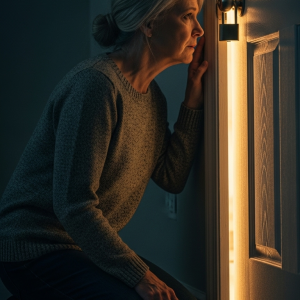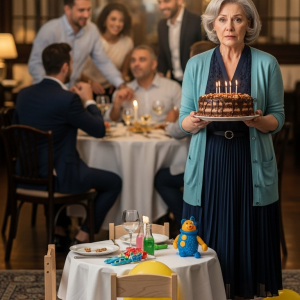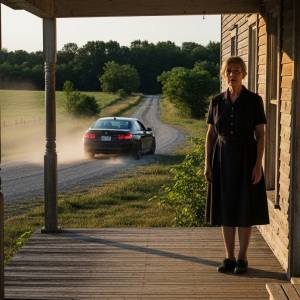When strangers disappoint you, that’s life. When your own children stab you in the back, that’s something else entirely. There comes a point where kindness becomes weakness, and forgiveness becomes foolishness.
The water dripped incessantly from my bathroom ceiling, a steady rhythm that mocked the state of my life at sixty-two. Each ping into the metal pot below echoed through my cramped apartment like a tiny hammer striking at my dignity. For thirty-five years, I taught high school English. I raised two children alone after my husband died, and I put them both through college without a penny of debt. I did everything right, or so I thought.
That Tuesday morning, I called my landlord for the fifth time. “Mrs. Rutherford, the leak is getting worse,” I said, trying to keep the desperation from my voice. “There’s a new one in the kitchen now, too.”
“I’ve got three properties with burst pipes from the cold snap, Michelle,” she said with finality. “The plumber will get to you when he can. Maybe next week.”
I hung up and stared at the water stains spreading across my ceiling like a disease. My phone pinged. It was my daughter, Melissa, posting on Instagram. I shouldn’t have looked, but some masochistic part of me always did. There she was, standing proudly in front of a handsome colonial house with a “SOLD” sign. Her arm was wrapped around her mother-in-law, Patricia.
The caption read: “So excited to help Mom P move into her dream home! She deserves every comfort after all she’s done for our family. #blessed #familyfirst”
I read it twice, a familiar coldness spreading through my chest. Mom P. Not me, her actual mother. But Patricia, who had done nothing but criticize Melissa until she married the “right” son. I scrolled through the comments, each one a fresh paper cut: “You’re such a wonderful daughter-in-law!” “Patricia is so lucky to have you!”
Three months ago, when my building was declared in need of major repairs, I’d asked Melissa if I could stay with them temporarily. Their house had five bedrooms. “Mom, it’s not a good time,” she’d said, not quite meeting my eyes. “Charles is up for partner. We need to make the right impression. You understand.”
I understood perfectly. I was an embarrassment. The shabby mother who might use the wrong fork at a dinner party. The phone rang, startling me. It was a number I didn’t recognize.
“Is this Michelle Campbell?” The voice was male, professional.
“Yes. Who’s calling?”
“My name is Michael Abernathy. I’m an attorney. I’m calling about your brother, William Campbell.”
I froze. William, my older brother, who I hadn’t spoken to in nearly twenty years, not since he’d sided with my cheating husband during our divorce. “What about him?”
“I’m sorry to inform you that William passed away last month,” the attorney said gently. “He named you as the sole beneficiary in his will.”
I laughed, a sharp, disbelieving sound. “That can’t be right.”
“Nevertheless, you are. Your brother amended his will eight months ago. He left you everything. His house in Beacon Hill, his investment portfolio, and his art collection. The estate is valued at approximately twelve million dollars.”
The room seemed to tilt. Twelve million dollars? After hanging up, I sat perfectly still as my mind raced. William had left me everything. My brother, who I’d written off as dead to me, had made me a millionaire.
I opened my phone again and looked at Melissa’s post. The perfect house for perfect Patricia, the mother who deserved every comfort. I scrolled further back. There were no pictures of me. Not from her birthday, not from Christmas. I was invisible.
I found the last text from my son, Samuel. “Hi, sweetie. Just wondering if you got the card I sent for your anniversary.” The message showed as “read,” but there was no reply. The last time he’d contacted me was six months ago, asking to borrow $2,000 for a “business venture.” He’d promised to pay me back. He hadn’t.

I walked to the bathroom and stared at my reflection. I barely recognized the tired, gray-haired woman looking back. But in my eyes, something was changing. A coldness was creeping in, replacing the hurt. The woman in the mirror straightened her shoulders.
William’s money wouldn’t just change my living situation. It would change everything. That night, as the rain continued to pour, I sat at my small kitchen table and began to make a list. Not of finances, but of emotional debts. A tally of betrayals. By morning, I had a plan. William’s gift hadn’t just given me financial freedom. It had given me the power to make things right.
The Beacon Hill townhouse was a world away from my cramped apartment. As I stepped inside, key in hand, I read the letter William had left for me.
Michelle, By the time you read this, I’ll be gone. Cancer has a way of clarifying things. I was wrong about Thomas. I discovered the truth years ago but was too proud to reach out. You deserved better from me, from everyone. I’ve watched from afar as your children became strangers to you. I saw how they took and took. This inheritance won’t fix what’s broken, but perhaps it will give you the freedom I never had—the freedom to live without begging for scraps of affection from those who should love you unconditionally. Use it wisely, little sister. William
I spent the next week settling into my new life. I hired a cleaning service. I bought new clothes—well-made pieces that fit properly. I visited a salon and let them color my hair back to its natural auburn, cutting it in a style that took years off my appearance. I looked like me again.
Neither of my children called. I was a ghost, vanished from a life no one cared about anyway. On day ten, I called Melissa.
“Mom?” she answered, surprised. “Is everything okay?”
“Everything’s fine,” I said smoothly. “I’ve had some changes. I’m in Boston now. My brother William passed away and left me his estate.”
Silence. I could almost hear the gears turning. “Uncle Will? How much did he leave you, exactly?” The question came too quickly, too eagerly.
“Enough,” I said. “I’ve inherited his townhouse in Beacon Hill. We can talk more when you visit. Give my best to Charles.” I hung up before she could respond. Samuel called within the hour.
“Hey, Mom,” he said, as if we spoke regularly. “Melissa told me about Uncle Will. That’s amazing news!”
“Yes, things are looking up,” I said. “How’s that business venture? The one you needed capital for?”
He hesitated. “Going great! In fact, we’re looking at expanding…”
“That sounds exciting,” I interrupted. “We should discuss it when you visit. You are planning to visit your only mother in her new home, aren’t you?”
“Absolutely! I could fly out next weekend!” So eager now. So attentive. After hanging up, I sat in my new study and looked out over the Boston skyline. The chess pieces were moving exactly as I’d anticipated. That afternoon, I visited a lawyer.
“I want to create a new will,” I told her after explaining my situation. “And I want to set up a series of very specific trusts.”
She nodded, taking notes. “What are your goals with these arrangements?”
I smiled thinly. “Teaching a lesson that’s long overdue.”
The next morning, we all gathered in the sleek conference room of my new lawyer, Rebecca Lynn. My children and my son-in-law, Charles, leaned forward eagerly as Rebecca began.
“Michelle has asked me to outline the structure she’s creating for her estate,” she said, her tone crisp and professional. “She has inherited a substantial estate valued at approximately nine million dollars after taxes.”
I watched their eyes widen. The number was finally concrete.
“Michelle has decided to create a series of trusts,” Rebecca continued, distributing documents. “The main beneficiary will be a new charitable foundation, The Michelle Campbell Foundation for Educational Equity, which will receive the bulk of the estate, approximately seven million dollars.”
“But what about us?” Samuel blurted out.
“The remaining two million is outlined on page three,” Rebecca directed them.
Melissa read aloud, her voice faltering. “One million to be held in trust for Michelle’s future care… and one million to be divided equally between Samuel and Melissa… to be dispersed under the following conditions.” She trailed off, her face paling.
“The trusts for Samuel and Melissa are structured as ‘ethical behavior trusts’,” Rebecca explained. “Each will receive quarterly payments of $12,500, contingent upon demonstrating consistent care and support for their mother.”
“What does that mean, exactly?” Samuel asked, his voice tight.
“It means,” I said, speaking for the first time, “that to receive your payment, you must show you’ve maintained regular, meaningful contact. Weekly phone calls, monthly visits, holiday celebrations. The things most children do naturally out of love, you will now do for money.”
The silence was absolute. “You’re bribing us to be your children?” Melissa’s voice trembled with indignation.
“No,” I said calmly. “I’m paying you to pretend to be the children I thought I had. The children I deserved. You’ve put conditions on our relationship for years. You only call when you need money. You buy houses for your mother-in-law while I live with leaking pipes. If you don’t like the arrangement, you’re free to walk away.”
“There’s more,” Charles said, still reading. “Something about loan forgiveness.”
“Yes,” Rebecca nodded. “Michelle has documented loans to both Samuel and Melissa totaling approximately $47,000. She’s willing to forgive these loans, provided you sign the trust agreements today.”
“Those were gifts!” Samuel protested.
I smiled thinly. “I’ve kept every text where you promised to pay me back. The choice is simple. Sign and receive fifty thousand a year for behaving like decent human beings, or walk away and pay back what you owe me. With interest.”
They signed, of course. Money speaks louder than pride.
The next month unfolded according to plan. The phone calls came like clockwork—stilted conversations filled with resentment barely concealed beneath pleasantries. Two weeks before Thanksgiving, I called them both.
“I’d like you to come to Boston for the holiday,” I said. “Bring Charles, and Samuel, do bring Rachel.” He hadn’t bothered to mention his girlfriend of three months, but her presence was all over his Instagram. They agreed, of course. Fifty thousand dollars ensured their compliance.
Thanksgiving Day was a masterpiece of culinary art and social discomfort. The meal was impeccable, catered by one of Boston’s top restaurants. The conversation was strained. As dessert was served, Melissa finally broke.
“This is ridiculous,” she said, setting down her spoon with a clatter. “We’re sitting here pretending this is normal when we all know why we’re really here.”
“Please, elaborate,” I said, taking a small bite of mousse.
“The trust, the conditions, this performance! It’s cruel, Mom.”
“Cruel?” I repeated, setting down my own spoon. “Let me tell you about cruel, Melissa. Cruel is buying a house for your mother-in-law while your own mother’s ceiling leaks. You said Patricia deserved every comfort. What did I deserve? The apartment with black mold? The disconnected heat last winter?”
“You never told us things were that bad!” Samuel interjected.
“I shouldn’t have had to,” I said, my voice sharp. “I was your mother. You should have cared enough to ask.”
“So this is punishment,” Charles said quietly.
“This is consequences,” I corrected him. “For the first time in your lives, you’re facing the consequences of treating someone as if they don’t matter.”
Rachel, Samuel’s girlfriend, looked between us all, comprehension dawning on her face. “You’re not going to forgive them, are you? No matter what they do now, it’s too late.”
The table fell silent. A young woman who’d known me for less than four hours had seen what my own children couldn’t. “The time for genuine reconciliation passed long ago,” I said softly. “Now we have a business arrangement. You pretend to care, and I pretend to believe you. In return, you receive financial compensation.”
The week before Christmas, an unexpected visitor arrived. Rachel stood on my doorstep, snowflakes melting in her dark hair. Samuel didn’t know she was there.
“I broke up with Samuel last night,” she said without preamble. I invited her in.
“After Thanksgiving, I started noticing things,” she explained. “The way he checked the calendar to make sure he didn’t miss the weekly call. Not because he cared, but because of the money. I thought you should know that your plan is working. Samuel is miserable. Melissa is drinking more than she should. They’re suffering.”
“And this surprises you?”
“No,” she said, meeting my gaze steadily. “But I also think you deserve to know that this victory won’t heal what’s broken.” She leaned forward. “You’re punishing them for treating you as a resource. But now, that’s exactly what you’ve become to them again—a resource to be managed for financial gain.”
Her words struck with unexpected force.
“My last foster mother,” Rachel said quietly, “told me something I’ve never forgotten. She said, ‘Hurt people hurt people, but healed people heal people.’ I didn’t understand it then. I think I’m starting to now.”
After she left, I sat in my study for a long time, turning her words over in my mind. Had I used William’s gift wisely? Or had I merely inverted the power dynamic without truly freeing myself from the pain?
On New Year’s Eve, I sat alone on my balcony in a luxury Aspen resort, watching fireworks explode over the mountains. My phone buzzed with obligatory, formulaic messages from my children. As the final fireworks faded, I made a decision.
Two weeks later, we gathered in Rebecca’s conference room again.
“Michelle has decided to restructure the trusts,” Rebecca announced. “The behavioral conditions are being removed. Instead, each trust will provide a one-time payment of $250,000, to be dispersed immediately. The remainder will be held until Michelle’s death, at which point it will transfer to you, with no strings attached.”
The silence was profound. “But why?” Samuel asked.
“Because the arrangement wasn’t healing anything,” I said, echoing Rachel’s words. “Not for you, and not for me. I’m freeing you from the obligation to pretend. And I’m freeing myself from the illusion that I can purchase what was never freely given.”
“So, you’re just letting us go?” Melissa’s voice held a hint of hurt I hadn’t expected.
“I’m releasing us all,” I corrected her. “The door remains open, but I’m removing both the carrot and the stick. Whatever relationship we have going forward will be based on genuine feeling, not financial calculation.”
I walked to the door, then paused, turning back to them one last time. “For what it’s worth, I hope someday you understand why I did this. All of it. Not to hurt you, but to finally set us all free.”
As I stepped out into the winter sunshine, I realized I was smiling. A real smile. Whatever happened next, whether my children reached out or disappeared forever, I was finally, truly free. William had given me more than money. He’d given me the chance to break the chains of expectation and to say, “This is who I am. This is what I’m worth. And I will no longer accept anything less.”




